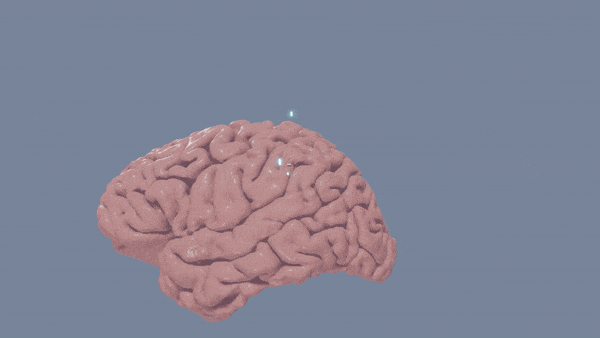December 28, 2023
4 min read
This year the explosion of interest in AI had a profound impact on how experts in the fields of neuroscience and psychology think about biological intelligence and learning

A video presents a stylized depiction of a new language decoding process. A decoder generates multiple word sequences (paper strips) and predicts how similar each candidate word sequence is to the actual word sequence (beads of light) by comparing predictions of the user’s brain responses against the actual recorded responses.
This year was full of roiling debate and speculation about the prospect of machines with superhuman capabilities that might, sooner than expected, leave the human brain in the dust. A growing public awareness of ChatGPT and other so-called large language models (LLMs) dramatically expanded public awareness of artificial intelligence. In tandem, it raised the question of whether the human brain can keep up with the relentless pace of AI advances.
The most benevolent answer posits that humans and machines need not be cutthroat competitors. Researchers found one example of potential cooperation by getting AI to probe the infinite complexity of the ancient game of Go—which, like chess, has seen a computer topple the highest-level human players. A study published in March showed how people might learn from machines with such superhuman skills. And understanding ChatGPT’s prodigious abilities offers some inkling as to why an equivalence between the deep neural networks that underlie the famed chatbot and the trillions of connections in the human brain is constantly invoked.
Importantly, the machine learning incorporated into AI has not totally distracted mainstream neuroscience from avidly pursuing better insights into what has been called “the most complicated object in the known universe”: the brain. One of the grand challenges in science—understanding the nature of consciousness—received its due in June with the prominent showcasing of experiments that tested the validity of two competing theories, both of which purport to explain the underpinnings of the conscious self.
The past 12 months provided lots of examples of impressive advances for you to store in your working memory. Now here’s a closer look at some of the standout mind and brain stories we covered in Scientific American in 2023.
AI Drives a Machine That Can Decode the Contents of Your Brain
Researchers proved the usefulness of merging AI with neuroscience by reporting how they combined a functional magnetic resonance imaging (fMRI) brain scan with AI-driven LLMs to try to figure out what is actually going on in a person’s head. Demonstrated at the University of Texas at Austin, the model replicated—with a fair degree of accuracy—the stories a person listened to or made up while in the scanner. The researchers recorded brain activity when the participant listened to certain words. The data from these scans were then used to train an AI model to detect patterns in how the brain activated in response to these words. Then the system took a new set of scans, and the AI predicted, based on its training, what a person heard during those scans. It may be some time before you can buy this kind of technology on Amazon; such deductive feats require a ton of training. The best the current system can do is provide a rough gist of what’s in your head.
Victories in Go Inspire Better Gameplay
When the “superhuman” AI created by Google’s outfit DeepMind defeated then champion Lee Sedol at the strategy game of Go in 2016, it spurred collective hand-wringing about what this kind of superiority might imply for humans (who had previously been felled by computers in chess). Some researchers took it upon themselves to study exactly how Go players reacted to the defeat. The findings, published in March, hold some optimism for the future of human collaborations with AI systems: The study revealed that the Go community took Sedol’s defeat as a learning experience. These players analyzed the program’s moves and discovered that some had never been seen before in human gameplay. They then incorporated those moves into their own games—an example of an AI-human interaction that ultimately improved human gameplay and offered ideas about how such collaborations can better human decision-making.
Will We Finally Understand Consciousness by the Year 2048?
Headlines around the world revealed the outcome of a 25-year-old bet between philosopher David Chalmers and neuroscientist Christof Koch. The wager, settled at a New York University conference in June, was over whether neuroscience would be able to supply a “clear” neural signature of consciousness by this year. Koch—who thought a quarter-century ago that the consciousness signature would be QED by now—had to reluctantly agree that this lofty goal had yet to be reached. He proceeded to fork over a case of fine wine to Chalmers, and then he vowed to revisit the matter in another 25 years to assess whether more “clarity” had been achieved toward hacking consciousness. The conference also highlighted the results of experiments intended to test two leading theories of consciousness; it was agreed that both of them need a lot more work.
Quashing Bad Thoughts Makes You Feel Better
Not everything in the brain sciences has to do with AI. Clinical psychologists have done stellar work without the need to necessarily draw upon the resources of an LLM. One simple at-home type of step has to do with turning off a negative flow of thoughts that might be streaming inside your head. The idea that if you ignore distressing thoughts and imagery, they’ll inevitably come back to haunt you later does not measure up, according to a study by researchers at the University of Cambridge in England. This is great news for people with anxiety, depression or trauma. Suppression of this flow of negativity really does seem to ratchet down the intensity of one’s inner fears.
